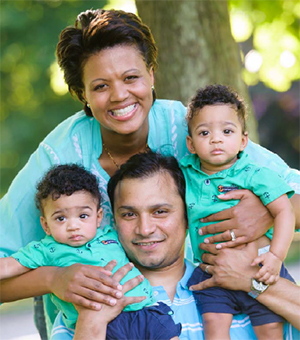Multiples and High Risk Pregnancy: The Vayal's Story
From High Risk to High Energy

"Whether your pregnancy and delivery are high-risk or not, Holy Cross Hospital surrounds you with caring, positive people who can answer your questions."
-Ashley Vayal (shown here with husband and twins)
In her 30th week of pregnancy, Ashley Vayal, then 26, was following her doctor’s recommendation for partial bed rest. But while Ashley was napping, her water broke. She and her husband, Haresh, went straight to Holy Cross Hospital, where specialists in the High-Risk Perinatal Center helped her twin boys get an additional 14 days of growth before delivery.
It could have been a time of anxiety, but as Ashley says, her obstetric and gynecology physicians at Holy Cross Hospital, Barbara J. Butler, MD and David A. Wagar, MD,and all of the staff were great at keeping her and Haresh informed and involved.
This included familiarizing the Vayals with the 46-bed Neonatal Intensive Care Unit (NICU) and its staff of specialized physicians, nurses and therapists.
During her two weeks at Holy Cross Hospital, Ashley stayed in the High-Risk Perinatal Center and received several ultrasounds in the hospital’s Perinatal Diagnostic Center, which provides expert consultation and prenatal diagnostic services to women with high-risk pregnancies.
Ashley also received all the information she needed about delivery options. Specialists explained the babies’ positioning and every possible scenario that could occur, so that shecould make informed decisions.
Ashley chose a Caesarian section and was awake during the delivery, hearing both babies give their first cries. Even before she went into her own recovery room, hospital staff brought her to the NICU to see her baby boys. “Ishant was red as a beet,but Ketan was white as a sheet,” she says.
Ketan, she learned, had been in shock at birth, with very low blood levels. In the NICU, he received the immediate care that Holy Cross Hospital is equipped to provide, even for the tiniest, earliest babies. Doctors and the family discussed possible treatments for his anemia and chose the solution with the least amount of risk: a medication that builds up red blood cells.
His brother, Ishant, while not in crisis, also received specialized premature infant care until he too could breathe and eat independently. Ishant was able to go home at four weeks; Ketan at five.
Staff made those weeks easier, Ashley says. “Nurses would share stories about how the boys’ individual personalities were emerging.
“When you see the other women taking their babies home … it’s such an overwhelming experience, and it’s easyto feel sad,” Ashley says. “But it felt like they really cared about my kids.”
Though Ashley was a daily visitor during the twins’ NICU stay, staff would also call to update her on medical details before and after her visits. Meanwhile, a hospital lactation specialist helped Ashley with breastfeeding and pump rental, so she could feed the babies throughout. And the new parents also took newborn care classes at the hospital.
Nine months after delivery, both Vayal babies are in great health. Ketanis now the more active of the two, busily trying to learn to crawl.
